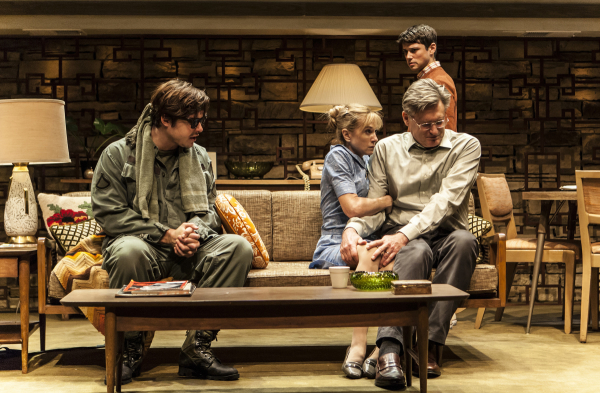Sticks and Bones
The New Group revives David Rabe’s debut play about a returning veteran of the Vietnam War.

(© Monique Carboni)
When David Rabe's Sticks and Bones played Broadway in 1972, audience members would frequently storm out of the theater. Of course, America was still actively involved in the Vietnam War. This story of an emotionally disturbed veteran and his ghoulish family must have felt like salt on an open wound. With nearly four decades separating us from that war, emotions don't run nearly as high. Still, The New Group's intense revival currently playing at the Pershing Square Signature Center proves this 43-year-old play to be tragically relevant as a new generation of Americans returns from fighting not one, but two foreign wars.
Written shortly after the author finished his service in Vietnam, Sticks and Bones was Rabe's playwriting debut. It started off-Broadway the Public Theater before producer Joseph Papp moved it to Broadway in 1972. Two of Papp's shows won Tony Awards that year: Two Gentlemen of Verona (Best Musical) and Sticks and Bones (Best Play). Papp used the profits earned by the former to subsidize the run of the latter. Considering its radical content and dark satire, it's easy to see why Sticks was not a box-office darling.
Ozzie (Bill Pullman) and Harriet (Holly Hunter) live in a suburban dream house with their youngest son, Rick (Raviv Ullman), a fudge-loving, guitar-playing little scamp. They're the all-American family, more delightful than any Norman Rockwell painting. That is until their oldest son, David (Ben Schnetzer), returns home from Vietnam. He was blinded in combat. He's also haunted by the ghost of Zung (Nadia Gan), a beautiful Vietnamese woman he left behind. Harriet becomes physically ill when she learns that her son slept with Zung. She calls Father Donald (Richard Chamberlain) to help straighten him out and bring him back into the fold. They just want to return to their lives of "cake and cookies and cars and coffee."
If these character names seem familiar, it's because they're taken from the 1950s sitcom The Adventures of Ozzie and Harriet, which depicted The Nelsons, a too-good-to-be-true family. Taken in the context of 1972, this was an almost too-cruel jab at the sunny materialism of the triumphal World War II generation. In 2014, few are likely to wax nostalgic about their Wonder Bread utopia. Miscegenation no longer has the power to truly scandalize and the audience likely attending this play will already be of the opinion that the Vietnam War was an unequivocal mistake.
All that considered, there's a youthful anger in the text that still has bite. Occasionally it treads into sanctimony: "You’re so selfish, Rick," David tells his brother during a welcome home party. "Your hair is black; it glistens. You Smile. You sing. People think you are the songs you sing. They never see you." At the same party, he treats his family to an extended and nauseating graphic description of the awful things he saw in Vietnam.
Schnetzer deftly navigates Rabe's linguistic and tonal minefield, which seems to shift without notice from realism to lyricism to political tirade. Every beat is crystal clear and feels perfectly natural in the moment. He brings an unsettling tension to the room every time he enters the stage. In stark contrast, Ullman marinates in a habitual, almost psychotic contentment.
Hunter oscillates between cartoonishness and tragedy. She mugs to the audience with the telephone cord or the vacuum like a housewife-themed clown, yet when faced with her terrifying son, she has all the emotional stability of a bamboo hut in a hurricane. It's shocking to hear such a fragile woman expressing practically fascistic racism, but I suppose most of us don't have to look very far back to find a similar kindly old racist amid our own family trees.
Director Scott Elliott brings their world roaring back to life with period costumes, mannerisms, and stage design. Set designer Derek McLane authentically fashions the world of early 1970s suburbia with faux-wood paneling and a disgusting pea-green carpet. Lighting designer Peter Kaczorowski bathes the space in a gentle incandescent glow. This is the plastic palace of a king who lived through the depression and is never looking back.
While David is ostensibly the main character, Ozzie actually goes on the more interesting dramatic journey, which Pullman brilliantly illuminates in all its painful complexity. An auto mechanic during World War II, Ozzie never saw combat like his son did. "I'm some kinda jerk because I wasn't out there blastin' away, huh? I was useful," he tells his son defensively, as if he doesn't really believe it himself. Yet when confronted with the realities of war, he doesn't actually want to hear it. None of them do. They'd rather watch a horror film on TV.
It's not so different from our present situation, in which most Americans would rather indulge in the grotesque fictional violence of Hollywood than see the real stuff on the evening news. And since there was never a draft for Iraq and Afghanistan like there was for Vietnam, an even smaller percentage of our population has actually been exposed to those conflicts. Quite regrettably, Sticks and Bones is still a searing critique of America's willful ignorance in the face of an ultra-violent international war machine operating in our name. We're no longer even emotionally invested enough to get up and storm out of the theater.









